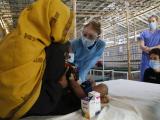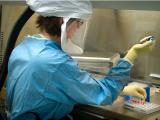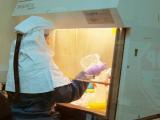Jul 24, 2002 (CIDRAP News) – Federal officials say that devices for quickly detecting Bacillus anthracis spores in the environment are not reliable and should not be used in assessing possible bioterrorism threats.
The White House Office of Science and Technology Policy (OSTP) said the Centers for Disease Control and Prevention (CDC) tested the devices for the FBI. "These studies found that all of the commercially available assays had low sensitivities, most had the potential to produce false-positives, and some produced false-negative results on samples that were truly positive," the OSTP statement said.
A CDC official said some of the tests had sensitivity and specificity of only about 50%, while others were slightly better or worse. Using the tests "would be equivalent to flipping a coin, unfortunately," said Charles Schable, MS, deputy director of the CDC Bioterrorism Preparedness and Response Program in the National Center for Infectious Diseases in Atlanta.
Federal facilities that are confronted with a "credible anthrax threat" should rely on laboratory culturing to detect anthrax in environmental samples, the General Services Administration (GSA) said. "Microbiological culture in a laboratory approved by the Laboratory Response Network is the validated standard for determining the presence of anthrax spores," the GSA said in a policy advisory for mail centers in the Washington, DC, area. "Field testing using polymerase chain reaction [PCR] or handheld immunoassays for the detection of B. anthracis is not recommended and should not be performed."
OSTP Director John H. Marburger III said in a memo to federal mail managers, "Bacillus anthracis detection thresholds for these devices are well above the minimum level that can infect personnel." The GSA advisory lists a detection threshold of 100 to 1,000 spores for PCR-based tests and 100,000 to 100 million spores for handheld immunoassays, whereas culturing may detect a single spore. Schable said most of the commercially available tests use PCR, but the detection threshold for some tests was as high as 1 million spores. (What constitutes an infectious dose of anthrax spores is unknown. During last fall's anthrax attacks, CDC initially suggested it would be a few thousand spores, but the deaths of two women from inhalational anthrax in the absence of any known anthrax exposure led to speculation that much smaller amounts could be infectious. However, the GSA advisory says that contamination levels in the range of 1 to 10 spores do not pose a threat.)
Federal officials noted that anthrax detection tests are not certified or approved by any federal agency. "There are no uniform standards to guide manufacturers as they develop these products," though one agency is working on such standards, states a question-and-answer report from the OSTP.
The Department of Health and Human Services (HHS) said it is not necessary to use rapid tests in assessing an anthrax threat. "In contrast to situations with chemical exposure where rapid decision-making (minutes) can be crucial to the protection and treatment of individuals, there are no examples of biological exposure where decision-making cannot wait for the results of validated laboratory procedures (1-2 days)," HHS said in a statement included in the GSA policy advisory. "Any perceived benefit of using currently available hand-held assays fall[s] short of the costs of unnecessary remedial actions and amplified public concern."
Federal, state, and local agencies have had to evaluate white powdery substances for anthrax many times in recent months, the HHS statement noted. In some cases, field tests yielded positive results, triggering the quarantine, isolation, or decontamination of people, but subsequent laboratory tests were negative.
"The devices used for the initial field tests included tickets and strips from at least four vendors," the HHS statement said. The CDC and FBI would not identify the manufacturers. The OSTP said the official FBI report of the CDC evaluation is being withheld "because of the sensitive nature of the material and the techniques used in the analysis."
Response Biomedical Corp., Vancouver, B.C., said yesterday that its recently released anthrax test was not included in the CDC evaluation. CDC and FBI officials contacted today said they could not confirm or deny the company statement. Response's product, the RAMP Anthrax Test, was put on the market May 29, the company said in a press release. The CDC evaluation of anthrax tests was presented to the White House May 31, according to the OSTP.
The CDC warned last October that rapid anthrax tests had not been validated. In the Dec 7, 2001, issue of Morbidity and Mortality Weekly Report, the agency said such tests should not be used alone as the basis for clinical or public health decisions.




















